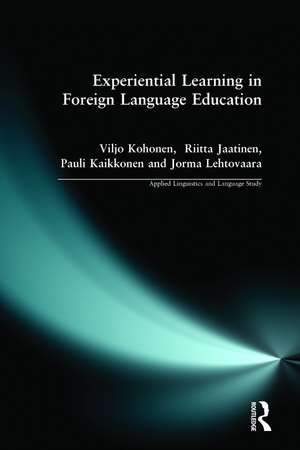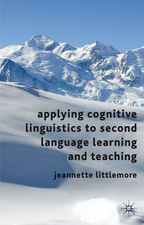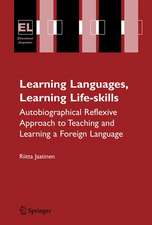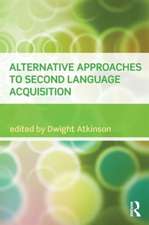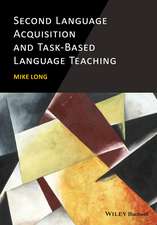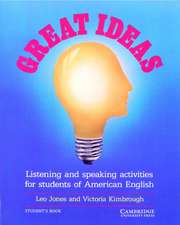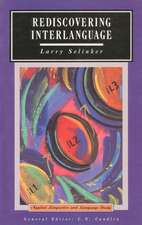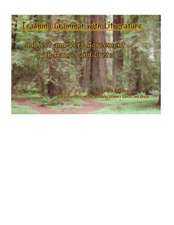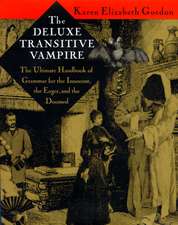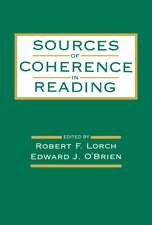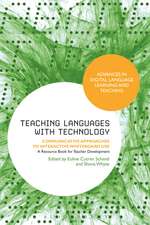Experiential Learning in Foreign Language Education: Applied Linguistics and Language Study
Autor Viljo Kohonen, Riitta Jaatinen, Pauli Kaikkonen, Jorma Lehtovaaraen Limba Engleză Paperback – 8 aug 2000
| Toate formatele și edițiile | Preț | Express |
|---|---|---|
| Paperback (1) | 482.35 lei 6-8 săpt. | |
| Taylor & Francis – 8 aug 2000 | 482.35 lei 6-8 săpt. | |
| Hardback (1) | 1000.27 lei 6-8 săpt. | |
| Taylor & Francis – 3 feb 2017 | 1000.27 lei 6-8 săpt. |
Din seria Applied Linguistics and Language Study
-
 Preț: 309.50 lei
Preț: 309.50 lei - 15%
 Preț: 427.16 lei
Preț: 427.16 lei - 18%
 Preț: 838.33 lei
Preț: 838.33 lei - 18%
 Preț: 1000.27 lei
Preț: 1000.27 lei - 18%
 Preț: 1001.87 lei
Preț: 1001.87 lei - 18%
 Preț: 1000.27 lei
Preț: 1000.27 lei - 15%
 Preț: 498.47 lei
Preț: 498.47 lei - 15%
 Preț: 564.39 lei
Preț: 564.39 lei -
 Preț: 471.67 lei
Preț: 471.67 lei - 18%
 Preț: 1218.08 lei
Preț: 1218.08 lei -
 Preț: 431.95 lei
Preț: 431.95 lei - 18%
 Preț: 945.01 lei
Preț: 945.01 lei - 18%
 Preț: 1000.51 lei
Preț: 1000.51 lei -
 Preț: 475.70 lei
Preț: 475.70 lei - 18%
 Preț: 1000.27 lei
Preț: 1000.27 lei -
 Preț: 469.94 lei
Preț: 469.94 lei - 18%
 Preț: 1218.08 lei
Preț: 1218.08 lei -
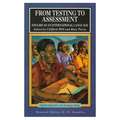 Preț: 469.34 lei
Preț: 469.34 lei - 18%
 Preț: 1000.27 lei
Preț: 1000.27 lei - 18%
 Preț: 1000.27 lei
Preț: 1000.27 lei - 15%
 Preț: 421.62 lei
Preț: 421.62 lei -
 Preț: 192.85 lei
Preț: 192.85 lei - 18%
 Preț: 1112.65 lei
Preț: 1112.65 lei - 18%
 Preț: 1000.27 lei
Preț: 1000.27 lei - 18%
 Preț: 1111.40 lei
Preț: 1111.40 lei - 18%
 Preț: 1000.27 lei
Preț: 1000.27 lei - 18%
 Preț: 1000.27 lei
Preț: 1000.27 lei - 18%
 Preț: 1003.43 lei
Preț: 1003.43 lei -
 Preț: 277.80 lei
Preț: 277.80 lei - 18%
 Preț: 1000.27 lei
Preț: 1000.27 lei - 23%
 Preț: 327.38 lei
Preț: 327.38 lei - 18%
 Preț: 1004.24 lei
Preț: 1004.24 lei - 15%
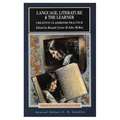 Preț: 563.42 lei
Preț: 563.42 lei - 18%
 Preț: 1000.27 lei
Preț: 1000.27 lei -
 Preț: 464.93 lei
Preț: 464.93 lei - 18%
 Preț: 1000.27 lei
Preț: 1000.27 lei - 18%
 Preț: 1000.27 lei
Preț: 1000.27 lei
Preț: 482.35 lei
Nou
Puncte Express: 724
Preț estimativ în valută:
92.30€ • 96.64$ • 76.55£
92.30€ • 96.64$ • 76.55£
Carte tipărită la comandă
Livrare economică 10-24 aprilie
Preluare comenzi: 021 569.72.76
Specificații
ISBN-13: 9780582315709
ISBN-10: 0582315700
Pagini: 200
Dimensiuni: 156 x 234 x 14 mm
Greutate: 0.29 kg
Ediția:1
Editura: Taylor & Francis
Colecția Routledge
Seria Applied Linguistics and Language Study
Locul publicării:Oxford, United Kingdom
ISBN-10: 0582315700
Pagini: 200
Dimensiuni: 156 x 234 x 14 mm
Greutate: 0.29 kg
Ediția:1
Editura: Taylor & Francis
Colecția Routledge
Seria Applied Linguistics and Language Study
Locul publicării:Oxford, United Kingdom
Cuprins
General Editor's Preface page xi 1 Introduction 1 2 Towards experiential foreign language education 8 2.1 Why experiential foreign language education? 8 2.1.1 Society developments 8 2.1.2 Paradigm shifts in curriculum, teaching and learning 11 2.1.3 Implications for experiential foreign language education 20 2.2 What is experiential learning? 22 2.2.1 Role of experience in learning 22 2.2.2 Foundations of experiential learning 24 2.2.3 Basic model of experiential learning 27 2.2.4 Directions and settings in experiential learning 31 2.2.5 Reflection and motivation in experiential learning 32 2.3 Awareness, autonomy, authenticity and coherence in experiential foreign language education 35 2.3.1 Framework of experiential language education in context 36 2.3.2 Developments in evaluation: authentic assessment 50 2.3.3 Coherence in. language learning through teacher development 54 2.3.4 Coherence through collegial school culture 56 2.4 References 56 3 Intercultural learning through foreign language education 61 3.1 Towards intercultural foreign language learning 61 3.1.1 Linguistics and foreign language teaching 61 3.1.2 The intercultural and the holistic approach 62 3.1.3 The shell of the native language and culture 64 3.1.4 Intercultural competence 66 vii Vlll Contents 3.2 Diversity and otherness - the basic concepts of intercultural learning 68 3.2.1 The need for intercultural learning 68 3.2.2 Encountering foreignness: what makes foreign foreign? 73 3.3 Culture and language 79 3.3.1 The concept of culture 79 3.3.2 Widening the concept of language 82 3.3.3 Intercultural learning and foreign language education 84 3.4 Toward culture-based experiential foreign language education 87 3.4.1 Curriculum development through teaching experiments 87 3.4.2 Research project: 'Culture and foreign language education' 88 3.4.3 Intercultural learning from the student's point of view 90 3.4.4 Intercultural learning: learning materials and methods in foreign language education 92 3.4.5 Intercultural learning: the site visit and student exchange in foreign language education 95 3.4.6 Intercultural learning: reflections on student experiences 97 3.5 Conclusion 100 3.6 References 102 4 Autobiographical knowledge in foreign language education and teacher development 106 4.1 .Lt\.autobiographical experiential knowledge in foreign language teaching and learning 106 4.1.1 Concepts 106 4.1.2 Goals of teaching and learning a foreign language 110 4.1.3 Nature of the process of teaching and learning a foreign language 113 4.1.4 Autobiographical content in teaching and learning a foreign language 114 4.1.5 Description of some guiding principles and activities in a language course for specific purposes 119 4.2. The knowledge of learners, the knowledge of learning 125 4.2.1 The importance of sharing experiences in learning 125 4.2.2 Significant learning experiences 126 4.3 Autobiographical experiential knowledge in teacher education and teacher development 129 4.3.1 Autobiographical knowledge in teacher education and teacher development 129 4.3.2 Autobiographical knowledge - reminisced experience 135 4.4 References 137 Contents IX 5 What is it - (FL) teaching? 141 5.1 Approaching the questions of (FL) teaching 141 5.2 What is the context of our questions about (FL) teaching? 151 5.3 A philosophically well-grounded conception of man as a necessary basis for (FL) education 156 5.3.1 The underpinnings of a (FL) teacher's beliefs and actions 156 5.3.2 A conception of man - the outcome of an ontological and an epistemological analysis of man 159 5.4 Implications for (FL) education emerging from a holistic conception of man 160 5.4.1 Education - practising of good living 160 5.4.2 Learning 161 5.4.3 Language 164 5.5 Language learning as learning the art of open dialogue 167 5.5.1 The essence of the art of open dialogue 167 5.5.2 Learning and practising the art of open dialogue 170 5.6. Conclusion 173 5.7 References 175 Index
Notă biografică
Viljo Kohonen , Riitta Jaatinen , Pauli Kaikkonen , Jorma Lehtovaara
Descriere
The goal of foreign language teaching is expanding from communicative competence towards an intercultural action competence. Essential in the new orientation is the shift towards a more balanced emphasis between the external factors in the learning environment and the personal capacity, conceptions, beliefs and assumptions inside the learner's mind. As part of the changes, assessment is seen as an important means of enhancing the learning processes, emphasising the role of reflective self-assessment. The text explores and integrates the necessary knowledge base and practices in foreign language education in terms of the basic concepts of experiential learning, intercultural learning, autobiographical knowledge and teacher development, together with the philosophical underpinnings of foreign language education.
